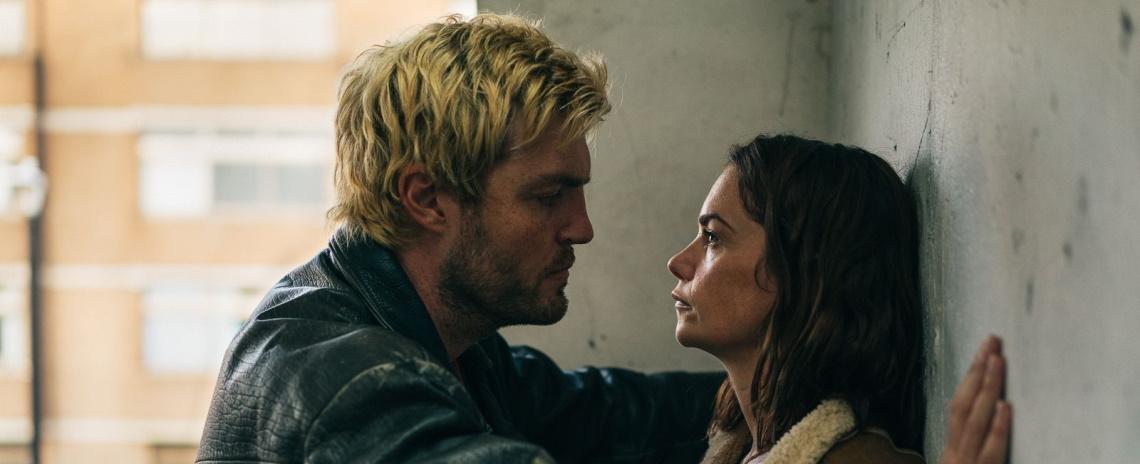Kate (Ruth Wilson) is terminally unextraordinary. She is pushing 40, lives alone, and appears to have exactly one friend, Alison (Hayley Squires), a married mother of three who regards Kate with a whiff of self-righteous pity. They work together at a nondescript public-assistance office, where Kate is scolded by supervisors for her slack work habits – and abused by clients who see an easy target for their bureaucratic frustrations. In her sad little flat of wilted plants and empty cupboards, she draws in her sketchbook and fantasizes in an abstract fashion about running away from it all. In her dreams, she is flat on her back on a beach, her summer dress hiked up, a half-glimpsed man savoring the taste between her legs. It’s not so much that Kate is yearning for a man: She simply wants to be wanted. She longs to be the kind of woman who receives enthusiastic oral sex in the sun-drenched surf, her hair kissed by sand and sea foam.
It is therefore at least a little understandable why she would be entranced by the swaggering, dyed-blond ex-con (Tom Burke) who slides into her cubicle one fateful day. He’s relaxed and irreverent, and asks her out almost immediately. He’s the sort of man who exudes the intoxicating musk of Bad Decisions, and Kate is powerless to resist its exotic allure. For their first date, such as it is, he walks her into a parking garage, tells her to remove her knickers, and proceeds to screw her senseless against a concrete wall. Kate is dazed by her own recklessness: She isn’t the kind of woman who gets railed by small-time hoods in car parks. Of course, this is precisely why the act enthralls her. It’s why she later illicitly looks up the man’s number on her workstation and texts him from the restroom. It’s why she ditches work the next day, hastily devising a transparent lie about a migraine attack to lounge naked with her new lover on a wooded lakeshore.
True Things, the sophomore feature from writer-director Harry Wootliff, initially seems like a story about the fervent, ultimately unstable dynamic that emerges between Kate and her Bad Boy paramour. However, the fact that the viewer never learns the man’s name – in Kate’s phone, he is simply listed as “Blond” – is a clue that Wootliff is less interested in the affair per se than in the changes it catalyzes in Kate. Which is perhaps for the best, as True Things doesn’t offer any especially novel or insightful observations about the contours of toxic relationships. To the viewer, the red flags quickly become apparent: In short order, Blond is ignoring Kate’s calls, showing up hours late to dates, and asking to borrow her car. The sheer banality of his negligence and narcissism are matched by the dispiriting predictability of Kate’s self-loathing. Such is her craving for something new, she gladly endures his careless indifference in exchange for short bursts of intense affection.
Of course, the triteness of Kate’s situation is likely the point. Adapted by Wootliff and playwright Molly Davies from Deborah Kay Davies’ 2010 debut novel, True Things is ultimately an impressionistic character study rather than a relationship drama. The bewildered question at the heart of the screenplay’s scenario – Why would any sensible, self-respecting woman involve herself with such an unreliable dirtbag? – begins to resolve itself when viewed through the lens of Kate’s personal evolution. Here is a woman who is so deeply entrenched in her rut, it might be impossible for her to escape its confines without the intervention of a volatile outside force. Hooking up with Blond might be a Bad Decision, but it is still a decision, expressing an agency that Kate has long craved but rarely experienced. She dreams of metamorphosis, and each irrational choice – every embarrassing act of servility or dizzying flirtation with calamity – is an assertion of self-determination, a potentially transformative ember.
It is a credit to Wootliff and her collaborators that this story – which could easily have devolved into a shrill, tearful slog – curves unexpectedly but effortlessly into a final act that trembles with exhilarating anticipation. A silent change occurs: The viewer is no longer waiting impatiently for Kate to wise up. They are leaning forward expectantly as she prepares to discard Blond and begin sorting out who she wants to be next. It’s a shift that is eased by the film’s aggressively hazy, diffuse aesthetic, which places the viewer firmly within Kate’s swirling headspace. Calling to mind the work of fellow British filmmaker Andrea Arnold, editor Tim Fulford’s fragmentary approach favors sensation without neglecting narrative. Meanwhile, cinematographer Ashley Connor’s handheld, shallow-focus camera work and soft, sun-fringed images bestow the film with the sweet-and-sour sensibility of memory.
Holding the whole thing together are Wootliff and Davies’ impressively parsimonious screenplay and Wilson’s characteristically engrossing, expertly shaded performance. True Things never states outright what can be effectively conveyed through its fine-tuned writing and acting. Seemingly trivial scenes, such as a phone call with a distracted Alison or a lunch visit with Kate’s disapproving parents, subtly convey sticky, convoluted emotional terrain. Wilson’s eminently expressive eyebrows and dimples – she is the reigning queen of what might be termed the smoldering grimace – are on full display here, but her portrayal of Kate is truly a whole-body endeavor. She slouches, fidgets, sulks, and staggers. She squirms in delight and sobs in self-disgust. She sways and writhes to PJ Harvey like no one’s watching, alone on a dance floor that throbs with the distinctive, lonesome potential of an empty discotheque. It’s in this cathartic moment that True Things reveals the nourishing liberation that waits on the far side of a bad relationship: a woman, alone, dancing just for herself.
Rating: B
True Things opens in select theaters on Sept. 9 and will also be available to rent from major online platforms.


